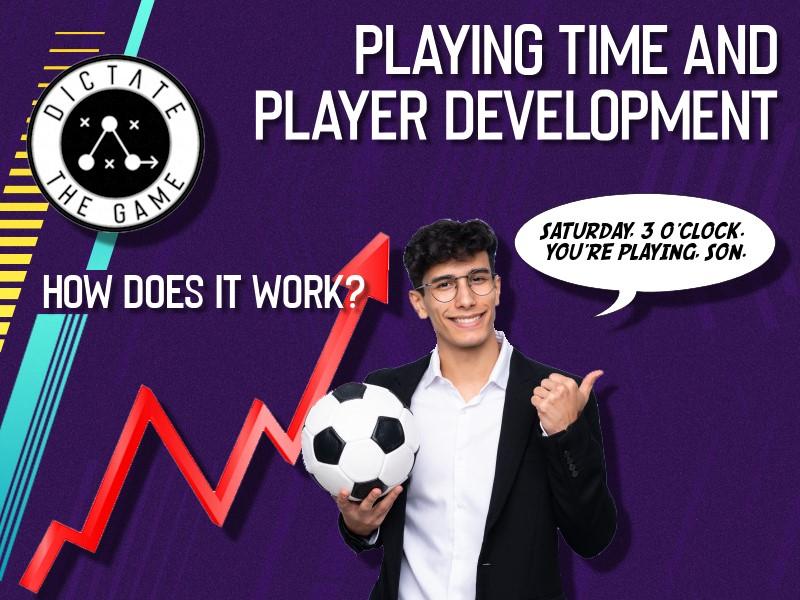
Playing time and player development on FM20
To play or not to play, that is the question for many FM20 managers. Especially when it comes to developing young players. U18 players highly value training, while older players need playing time to keep developing. Playing time alone isn’t enough though, as a manager you need to provide your player with games at the right level. The level needs to be challenging, but not too difficult. The optimal level will vary based on age, current ability and potential ability. Therefore I created an experiment to test the importance of playing time on player development on FM20.
Aim – Effect of playing time on FM20 player development
Ten years ago, Shrewnaldo did a series of tests to help unravel the mysteries of Football Manager. This article is very much in the spirit of his work. The aim was to create an experiment that isolated the variable of playing time and its effect on player development, by making all other variables as identical and/or static as possible. I spent countless hours in the editor before launching the experiment. The experiment ran for one season in which I manually took control of almost all aspects of it.
Method – Creating a “Training Experiment” club
I replaced Arsenal with a new team called “Training Experiment” playing in an EPL that had the reputation bumped to a maximum of 200. Everything at the club was maximised as well, facilities wise.
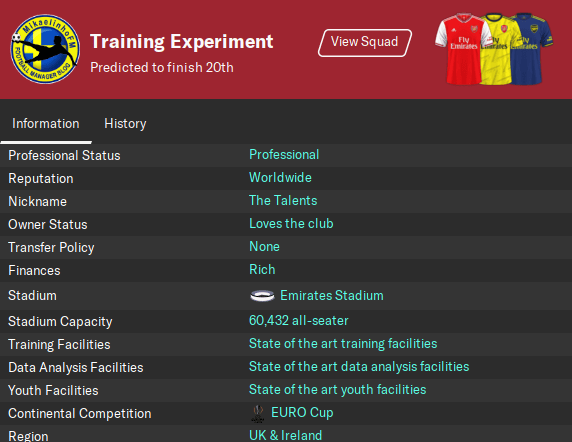
Squads and players
I filled the three squads (first team, U23s and U18s) with 22 players each, all 16 years old when the experiment started.
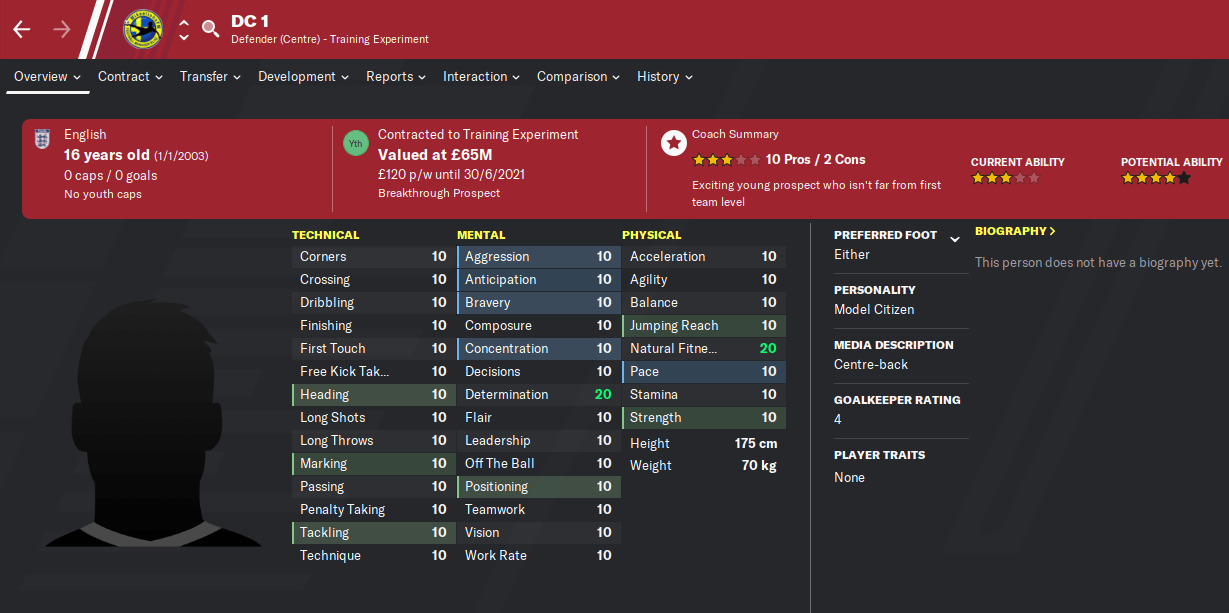
Every player started with these attributes, but with different preferred positions.
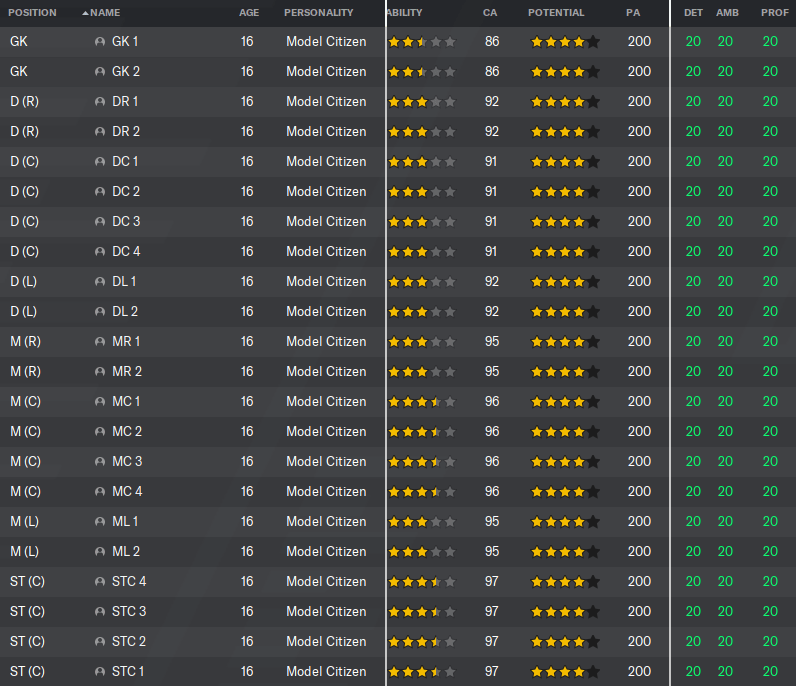
They all had a 200 PA and a CA equal to their RCA based on position. They were given a “Model Citizen” personality with an identical setup of all 20s in Determination, Ambition and Professionalism.
The strategy was to play the no1 choice in each position (no1 and 2 for the positions with two players in the starting eleven) as much as possible, and the other player(s) in the same position as little as possible. By doing this for all three squads we would get two things. Firstly, a measure of the actual importance of playing time. Secondly a potential difference on player development based on which squad you got your playing time.
Training
I didn’t give specific positional/role training or an additional training focus to any player. Training was set at “Double intensity” for everyone.

A top notch coaching staff ensured that the coaching role rating was 5 stars for every coaching responsibility.
Training was identical for each week of the season and for all three squads. I am well aware that this setup is not the optimal one. The aim of this experiment is to test the impact of playing time though, not to find the best training regime. Therefore, an identical setup was more important than a good one.
Tactics
I used a very straight-forward 4-4-2 setup for each and every game. Simple before better. Again.
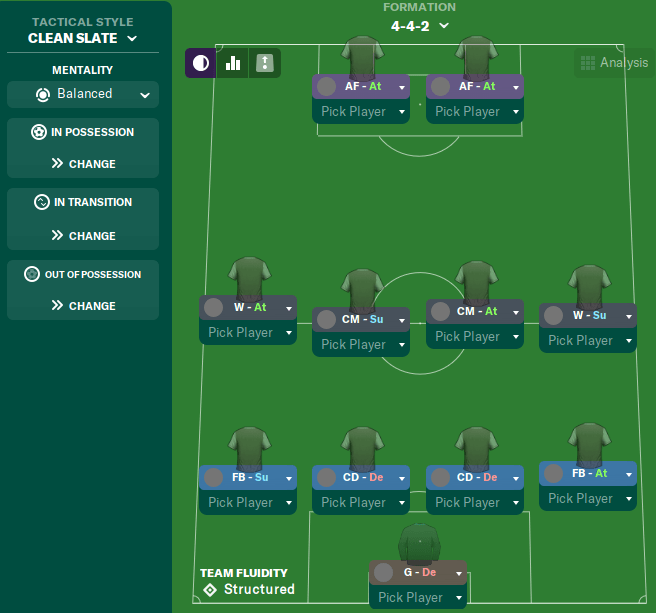
Length
The experiment was carried out over one season. I manually set the starting eleven for every game to make sure that the right players started the games. I didn’t actually play the games so my assistant manager was in charge of. The in-game editor was used to remove any injuries along the way.
Summary
A one season experiment where the effect of playing time on FM20 player development will be assessed. The 66 players in the experiment were all created identical except for preferred position. Half of the players would play as much as possible and half of the players as little as possible.
Results – Does playing time matter on FM20?
All players improved over the season. Let’s get that out of the way immediately.

This was the sight that met us week in and week out. At least three players with a 10.00 training rating, probably mostly down to the fact that we were dealing with an exceptional group of youngsters with Model Citizen personalities.
Since I manually took charge of the team selection process for all three squads and used the in-game editor to remove injuries, it was a fairly easy task to get half the players to start many (>40) games and the other half to start few (<5) games. The only aspect I couldn’t control was the U20s national team call ups. We had a total of 17 players called up over the season, but that only had a slight impact on number of games played.
Intra-squad comparison
In the below table you have the outfield players of the three squads divided into two groups by number of starts (many=over 40 and few=under 5). The figures in each column represents each player’s total attribute point improvement over the season. Figures in bold represent the higher improvement compared to the player of the same position.
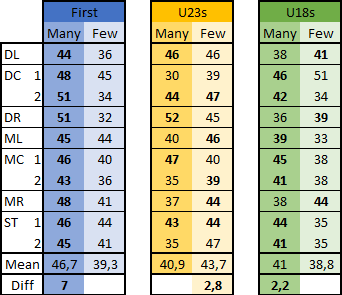
The players in the First team squad with many starts displayed the highest improvement (mean 46.9) overall and also the biggest intra-squad difference compared to the group with few starts (difference 7.0). This significant difference was also reflected on the individual level, with each player in the “many starts group” improving more than the corresponding player in the “few starts group”. The two players with the highest improvements (51) were found in the “many games group”.
For the U23s results were mixed. The mean was higher for the group with few starts (difference 2.8), but the individual player with the highest improvement (52) came from the group with many starts.
U18s displayed a similar pattern to the First team squad. A higher mean (difference 2.2) for the “many starts group” compared to the “few starts group”. Also seven out of ten players in the “many starts group” with a higher improvement compared to the corresponding player in the “few starts group”.

To summarize it appears that on a group/squad level it is better to play many games than just a few or none. What happens if we look more into the individual results?
Individual results
Which players made the biggest improvements over the season? In the below table I have listed the 10 best developers and their total attribute point improvement.
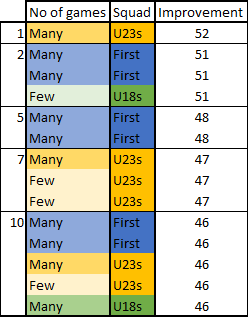
The list, which consists of fourteen names due to a five way tie for 10th place, shows us two things. Firstly, ten of the fourteen names on the list come from the “many starts” groups with only four from the “few starts” groups. Secondly, the U18s only have two players on the list, with six each from the first team and the U23s.
Conclusion
What sort of conclusion can we draw from this then? Well, for this specific experiment playing time seemed to have an impact on FM20 player development. It also appears to be better to play games in a higher reputation league/team, even at age 16. The fact that the U23s showed very mixed results is a bit puzzling, but at least it appears to be slightly better to promote a talented 16-year-old to the U23s from the U18s from a player development point of view.
Discussion – What’s next?
I really enjoyed this experiment and I believe that we might be on to something here. However, the sample size is so small that any real conclusions are hard to draw. I want to expand on this though and have a series of new experiments lined up. The next thing to do is to replicate this exact test several times to get more data. Secondly I want to try this out with other ages as well. How much difference does a year make? Is it more important for a 17-year-old to play in the first team than a 16-year-old? How much does the importance of playing time increase when a player turns 18? Can a 21-year-old with a low CA but a massive PA still develop into a world class player in the right environment or is it too late?
As you see, the questions are many but the answers are still few. I’ll be back soon with a new experiment, hopefully answering one or two of these questions!
I hope you enjoyed this playing time experiment. If you have any questions please comment below, or let us know via our social media channels.
You can follow our twitter here. Alternatively, like our Facebook page here.
Other articles you may enjoy:
How Crucial are Assistant Managers?
Expected Assists (xA) and Received Passes in FM20
Unsung Heroes: Complete Wing Back